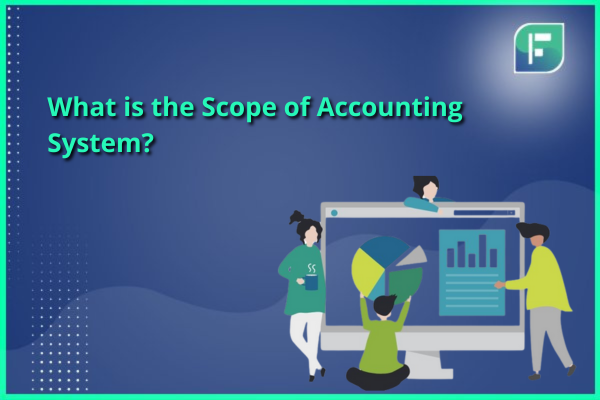The scope of accounting system includes a range of sectors, ranging from business and trade to government entities, financial organisations, individuals, and even families. Accounting principles regulate all these diverse activities. While some may perceive accounting as primarily dealing with a firm’s financial transactions, this is a misconception. Every type of business entity, including individuals and families, necessitates an accounting system.
Financial transactions occur incessantly not only in business organisations but also within government offices, non-trading enterprises, and among professionals. In this article, we shall see the scope of accounting system, and its various applications.
What is Accounting?
Accounting is like organised record-keeping for companies and businesses. It involves collecting and looking at both money-related and other important information. Essentially, accounting helps businesses to know how they’re doing financially now and how they should plan for the future. It’s like a tool for smart planning.
Applications of Accounting
The scope of accounting system serves various purposes for businesses, individuals, and organisations. The diverse applications of accounting in different contexts have been mentioned below:
In Business
Accounting and bookkeeping services play a crucial role in the business world, offering a multitude of applications:
1. Financial Monitoring: Businesses use accounting to closely monitor their financial data. This data empowers them to make informed decisions regarding resource allocation and revenue enhancement.
2. Financial Statement Analysis: Financial statements provide a clear idea of a company’s assets, liabilities, and owner’s equity at a specific point in time. These reports are indispensable tools for managers, and stakeholders to assess a company’s financial health.
For Individuals
Accounting is equally valuable for individuals in managing their personal finances:
1. Asset Tracking: Personal financial statements enable individuals to track their assets, including savings, investments, and property. This information aids in making financial decisions and setting financial goals.
2. Budgeting: Accounting helps individuals create budgets, enabling them to plan and manage their income and expenses effectively.
3. Financial Planning: Through accounting, individuals can allocate funds for future needs, such as retirement, education, or emergencies.
In Auditing
Auditing is a specialised field within accounting that ensures accuracy and compliance:
1. Auditor’s Role: Auditors are professionals who meticulously analyse financial statements to verify accuracy and adherence to financial regulations. They also scrutinise for irregularities and potential fraudulent activities.
2. Service Availability: Auditor services are available to a wide range of organisations, including businesses, government entities, and non-profit organisations, ensuring transparency and accountability.
In Taxation
Taxation is a vital aspect of accounting with significant implications:
1. Generating Government Revenue: Taxation is fundamental method for governments to generate revenue and for providing the necessary funds for public initiatives and essential services.
2. Annual Tax Filings: Both individuals and businesses have a responsibility to submit their annual tax returns.
So, accounting includes a broad range of applications that benefit businesses, individuals, and society as a whole. By recognising the extent of accounting and its various applications, individuals and organisations can harness its power more effectively for their financial well-being and compliance with regulatory requirements.
Scope of Accounting System
The scope of accounting system is very wide, serving various sectors and individuals. Mentioned below are the different scopes in accounting, illustrating its significance across multiple domains.
1. Personal Finance Accounting
Individuals and families utilise accounting to record and manage their personal financial transactions. This includes tracking assets, liabilities, income, and expenses to maintain financial stability. This explains the scope of accounting system in personal as well as daily activities that require finance.
2. Business Accounting
Often referred to as the “Language of Business,” accounting is indispensable for enterprises aiming to achieve profitability. Businesses meticulously record financial transactions to assess their operational performance and financial standing, facilitating strategic decision-making.
3. Non-Trading Organisations Accounting
Accounting extends its reach to non-trading organisations such as educational institutions (schools, colleges), healthcare facilities (hospitals), religious institutions (madrasas, mosques, temples, churches), and social clubs. These entities engage in financial activities that require accurate accounting to manage their resources effectively.
4. Government and Public Sector Accounting
Government agencies, courts, and state-owned enterprises rely on accounting systems to monitor income and expenditures, ensuring efficient governance and resource management. Accounting data plays a significant role in national development planning, budgeting, and assessing the progress or regress of a nation.
5. Professional Accounting
Professionals from various fields, including doctors, engineers, lawyers, actors, and actresses, maintain their income and expense records. They use accounting principles to manage their finances effectively and fulfil tax obligations, ensuring compliance with income tax regulations.
Hence, the diverse scope of accounting system demonstrates its universal applicability across personal, business, non-profit, governmental, and professional realms. It serves as a vital tool for financial management, transparency, and decision-making in these diverse contexts, underscoring its fundamental role in modern society.
Final Thoughts
The scope of accounting system is versatile and affects personal, business, and professional areas. It’s like the backbone of managing money, helping people and businesses keep track and make smart decisions about their finances. Whether it’s tracking everyday spending or handling complex money matters for companies and governments, accounting is crucial. It ensures things are clear, rules are followed, and money is used wisely.
Professionals from various fields also rely on accounting principles to manage their income and expenses efficiently. As a language of business and governance, accounting’s diverse scopes underscore its essential role in modern society, promoting financial stability, accountability, and economic development.





